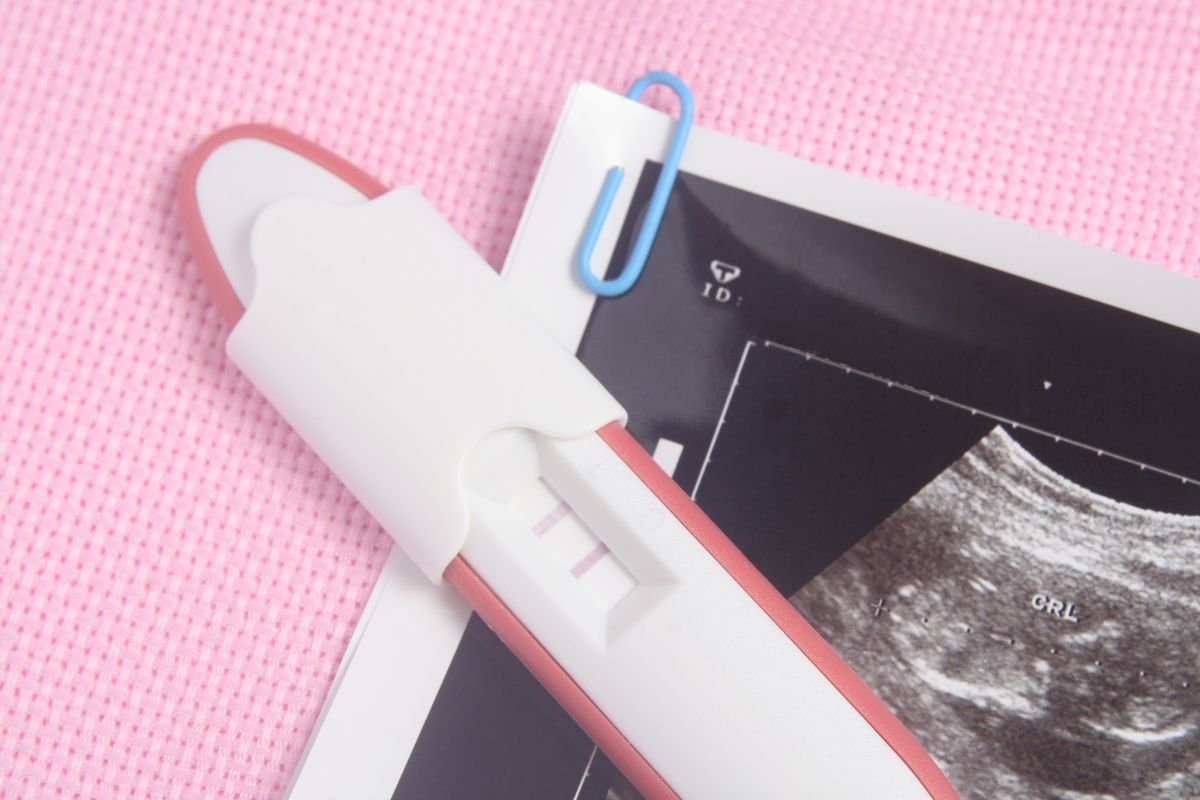Throughout my pregnancy I spent many sleepless nights which left me staring at the ceiling in frustration while everyone else slept peacefully.
Despite my body reaching extreme exhaustion I couldn’t find sleep.
During your pregnancy insomnia experience I see you and want to assure you that you’re not alone in this journey.
Throughout those sleepless nights I attempted everything from counting sheep which didn’t work to drinking warm herbal teas which improved my situation a little.
The wind-down ritual that unexpectedly became my favorite trick combined gentle stretching with listening to calming music before sleep.
While it wasn’t a perfect solution the routine allowed me to fall asleep more quietly on several nights.
This article explores the common causes of pregnancy insomnia and shares strategies that helped me and countless other moms get some much-needed shut-eye.
Table of Contents

Why Is Insomnia Common During Pregnancy?
During pregnancy women experience significant physical and emotional changes.
Unexpected disruptions to sleep occur due to the changes that happen during pregnancy.
1. Hormonal Changes
During pregnancy hormonal changes especially increased progesterone levels disrupt sleep regulation.
My first trimester brought constant daytime sleepiness followed by night-time wakefulness.
2. Physical Discomfort
A growing belly and backaches alongside frequent bathroom breaks make it hard to find a comfortable position for sleeping.
During my third trimester I surrounded myself with a fortress of pillows—one supporting my back and one resting between my legs while another one was there for me to hug.
A quality pregnancy pillow has the power to change your life for the better.
3. Emotional and Mental Strain
Anxiety about labor and financial matters as well as new motherhood responsibilities make your thoughts race through your mind even after you turn off the lights.
By writing in my journal before sleep I found my tool for mental decluttering.
Writing my thoughts and tasks down before bed stopped them from keeping me awake at 2 a.m.
Different Types of Insomnia
Acute Insomnia: Acute Insomnia develops briefly because of temporary stress factors or bodily changes.
After stressful prenatal appointments or during body growth spurts your sleep usually gets disrupted for a couple of nights while your body adapts.
Chronic Insomnia: Chronic Insomnia persists beyond three months because of persistent anxiety, mood disorders or constant physical discomfort.
How Insomnia Affects Pregnancy and the Baby

Pregnancy brings vast physical transformations to the body yet inadequate sleep disrupts these normal processes.
Here are some potential consequences:
Increased Stress Hormones: Not getting enough sleep boosts the amount of cortisol in your body which can lead to health problems like high blood pressure and gestational diabetes.
People always told me to relax yet it was impossible when my body lacked energy.
Reduced Oxygen Flow: Sleep deprivation creates conditions where oxygen flow to the baby decreases which can negatively impact fetal development.
Risk of Preterm Delivery: Preterm birth risks increase when severe insomnia extends over long periods.
Mood Disorders and Mental Fog: Sleep deprivation caused mood disorders and mental fog which made me more irritable and forgetful. Basic tasks such as keeping track of prenatal appointments or putting together snacks for work turned into difficult tasks.
Fatigue during pregnancy affects your emotional state and your motherhood preparation process while making the initial postpartum period more challenging.
The thought of caring for a newborn became frightening because I struggled to take proper care of myself.
Common sleep disturbances during pregnancy

There are several reasons why sleep can be elusive during pregnancy:
1. Hormonal Changes
During early pregnancy you’ll notice progesterone levels jump up which leads to daytime sleepiness and sluggishness.
Yet the high levels of progesterone during pregnancy prevent you from obtaining restorative sleep at night.
Many nights found me awake in bed although I experienced exhaustion throughout the day.
My body behaved like it had lost the ability to power down at night.
2. Physical Discomforts
Sleeping becomes more difficult to manage as your belly expands with pregnancy.
During the nights I experienced relentless back pain and heartburn which became my constant sleep disruptors.
Using pillows to prop myself up eased my heartburn symptoms and stretching gently before bed helped alleviate my back pain.
We can’t overlook how often we needed to visit the restroom!
During the third trimester I experienced so many bathroom visits that I felt like I was running a midnight competition for “Most Bathroom Visits in a Night.”
3. Emotional Factors
Worries about childbirth or parenting along with financial concerns continue to disrupt your sleep after turning off the lights.
My mind would wander as I listed potential baby names and checked nursery readiness during those restless nights.
Keeping a journal helped me clear my thoughts before going to sleep.
When to seek medical attention for insomnia during pregnancy
Most people experience some sleepless nights which are normal occurrences that can typically be managed.
However, there are times when professional help is essential:
Frequent, Severe Insomnia: You should consult your healthcare provider when you cannot fall or stay asleep for more than two weeks even after trying relaxation techniques.
Impact on Daily Life: When insomnia interferes with your work performance or relationships with loved ones seek professional support immediately.
Signs of Depression: Ongoing sleep problems may cause depression or anxiety which remains unresolved after childbirth if no treatment occurs.
At my lowest point I consulted my doctor who confirmed I wasn’t alone and provided practical solutions which helped me.
Always seek help when needed because it shows strength instead of weakness.
Daytime Habits to Set the Stage for Better Sleep

The decisions you make during the day affect your nighttime sleep quality. Here are some tried-and-true tips:
Stick to a Consistent Sleep Schedule
Maintain the same bedtime and wake-up schedule daily including weekends to help regulate your internal clock.
By maintaining this regular schedule I could better manage my internal clock which allowed easier evening relaxation.
Incorporate Moderate Exercise
My sleep improved significantly through daily routines of walking and prenatal yoga.
My daily physical activity improved my sleep quality at night.
Complete your workout sessions several hours before your planned bedtime for better sleep quality.
Mind What You Eat and Drink
Steer clear of eating substantial meals before bed and avoid consuming spicy or acidic foods since they can cause heartburn.
A late-night pizza craving taught me this lesson after it left me awake for hours.
Limit caffeine intake, particularly after midday. I started drinking chamomile herbal tea as my preferred beverage in the evening.
Create a Relaxing Evening Routine
One of my favorite relaxation methods before bed was taking a warm bath.
The relaxing heat helped relax my muscles and told my body it was time to let go of stress.
Calming music sessions and reading light books assisted in preparing my mind for sleep.
Unplug Before Bed
Melatonin production gets disrupted by blue light from electronic devices.
I decided to keep my phone on “Do Not Disturb” and read a paperback book instead of browsing social media.
Creating a sleep-conducive environment

The bedroom must serve as your sanctuary which supports relaxation and comfort. Here’s how to set it up for better sleep during pregnancy:
Keep the Room Cool
People sleep best when their bedroom temperature stays between 60°F (15°C) and 67°F (19°C).
When I reduced the thermostat setting by several degrees I found that I fell asleep faster.
Invest in Comfortable Bedding
A supportive mattress combined with soft breathable bedding serves as a true game-changer for sleep comfort.
The best pregnancy pillow became my lifesaver by giving essential support to my expanding abdomen and sore back.
Eliminate Distractions
Disable all electronic devices which produce bright lights and distracting noises.
The overpowering aromas from air fresheners and candles can be too stimulating so I used them sparingly.
Block Out Light and Noise
The blackout curtains became essential for me because they allowed me to nap during the day without issue.
Consider using an eye mask or earplugs if streetlights or noise bother you.
Rearrange Furniture for Comfort
Position electronic devices away from your sleeping area and maintain enough space so you can stretch without limitations.
My relaxation improved when I designed my space to be clutter-free and peaceful.
Sleep position during pregnancy

During the later stages of pregnancy sleeping on your back can decrease blood flow to the uterus resulting in reduced oxygen and nutrient supply to your baby.
This position can compress major blood vessels which causes dizziness or breathing problems.
During my second trimester I experienced back sleeping discomfort when I woke up feeling dizzy after sleeping in that position multiple times. I transitioned to sleeping on my side which turned out to be my salvation.
Best Sleep Positions for Pregnant Women
Here are some sleep positions and techniques that may help with insomnia and discomfort during pregnancy:
1. Left Side Sleeping (The MVP)
Sleeping on your left side is widely recommended by healthcare providers because it:
Improves circulation to your baby and uterus.
Reduces pressure on your liver, helping digestion.
May reduce the risk of stillbirth and improve overall blood flow.
Pro tip: To minimize hip strain during sleep try using a pillow between your knees. The game-changer for my experience was the third trimester.
2. Body Pillow for Full Support
I made a good body pillow my nightly companion.
This body pillow gave my expanding belly and hips additional padding.
I positioned it between my knees then hugged it to feel comforted. I constructed a protective barrier around myself and this method proved effective!
3. Reclined Position
When lying flat becomes uncomfortable switch to sleeping at an angle by using pillows or sitting in a reclining chair.
The reclined position greatly helped manage heartburn during those nights when it was especially persistent.
4. Elevated Head
Using pillows to prop yourself up or a wedge can help lessen heartburn and improve breathing.
Additional Tips for Restful Sleep During Pregnancy

Gentle Stretching Exercises: Restless Leg Syndrome during pregnancy became more manageable for me because I stretched my calf muscles before bedtime.
Hot/Cold Compresses: I found that nighttime leg cramps became less bothersome when I applied hot or cold compresses to my painful areas.
Massage Therapy: Sleep preparation through gentle massages before bed improved circulation while easing discomfort. My husband started massaging me regularly which strengthened our relationship.
Avoid Back Sleeping: When you sleep on your side it prevents your airways from closing which stops snoring and enhances breathing.
Maintain a Healthy Weight: Pregnant individuals should maintain physical activity and proper nutrition because obesity can make sleep apnea worse. My mood improved and sleep quality increased as a result of my daily walking routine.
Use a Humidifier: A cool-mist humidifier maintained moisture in the air which helped ease nasal blockages while also decreasing snoring.
Limit Fluid Intake Before Bed: This tip was a game-changer for me. To cut down on nighttime bathroom visits I began drinking water earlier during the evening and stopped drinking an hour before sleeping.
Practice Pelvic Floor Exercises: By doing Kegel exercises I was able to strengthen my bladder muscles which led to fewer urgent bathroom trips at night.
Adjust Sleep Positions Regularly: I experienced less bladder pressure and improved comfort by moving slightly during sleep throughout the night.
Final Thoughts
I’ve experienced those restless nights firsthand as I watched the clock tick with thoughts about motherhood racing through my mind.
But here’s the good news: you’re not alone.
Analyzing the causes of your insomnia and implementing useful methods including environment adjustment and proper sleep positioning will help you recover lost restful hours.
With various pillows and positions along with relaxation methods you can establish a sleep arrangement.
To find the best sleep position during pregnancy you need to pay attention to your body’s signals and make minor changes until you find what works best for you.
Reach out for help whenever you need it from your doctor.
This stage passes just as all pregnancy stages eventually do. And before you know it you will be cuddling the sweet little one who made every moment worthwhile.




[…] can also read my article on how to beat pregnancy insomnia here to overcome those sleepless […]